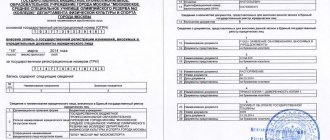Individualization of a legal entity
The name is the main means of individualizing a legal entity. It cannot be repeated among different companies and must be unique.
The law does not consider the name of an organization as an object of intellectual property. This means that the law and the judiciary do not protect the right to means of individualization of legal entities.
It should be noted that the presence of a name for an organization does not yet indicate its recognition as a subject of civil law; this requires state registration, i.e. actual recognition of the company by legal entity. face.
The name of a legal entity as a method of individualization
The name of a legal entity that is engaged in a specific business activity is a business name. It must also be unique.
The right to a corporate name of a legal entity arises from the moment of registration of the company. Data about it are entered into the Unified State Register of Legal Entities. IN
Unlike a regular name, a company name is the object of exclusive personal right and is protected by law. Art. 54 of the Civil Code of the Russian Federation provides that a company that has the right to a company has the right to demand the cessation of the illegal use of its company name; it also has the right in this case to demand compensation for losses caused, which may be caused, for example, by the loss of customers.
Indication of the location of the company in the charter and the Unified State Register of Legal Entities
The separation of the concepts of location of a company and address of a legal entity led to the following results:
- The new edition of Article 54 of the Civil Code of the Russian Federation prescribes that the charter of an LLC must indicate the location of the legal entity (name of the locality) without indicating the address of the legal entity. In practice, this means that now, if the address of a legal entity changes within the same locality, there will be no need to make changes to the charter.
- At the same time, according to paragraph 3 of Article 54 of the Civil Code of the Russian Federation, it is necessary to enter into the Unified State Register of Legal Entities information about the address of the legal entity, which is located within the location of the company. In Russian, this means that the Unified State Register of Legal Entities indicates both the location (municipal entity) and the address of the legal entity in full.
- According to Federal Law No. 67, from January 1, 2016, changes in the address of a legal entity are also divided. If there is a change in the location of the company, then this change is carried out in two stages. First, you need to obtain permission to change the location, and then, as a second step, change the address of the legal entity. If, when changing the address of a legal entity, the location does not change, then the registration procedure occurs in one stage.
Our eRegistrator.ru service will help you prepare documents for registering changes in the location and address of a legal entity. As a result, you will receive a completed form p13001
or p 14001
, as well as other documents required for registration.
Components of a name, requirements for the name of a legal entity
Civil legislation (Article 54) regulates the requirements for the “name” of a company:
- it must contain an organizational and legal form,
- and the immediate name of the company.
There is no need to indicate the type of activity in the name. The exception is organizations that are required by law to do this, for example audit companies.
The company can use the corporate name of a legal entity in any way that does not contradict the law. It can be placed on advertising signs, appear in the company’s primary documentation, be indicated on product packaging, etc.
The main difference between a company name and a trademark is the inability to dispose of it. The brand name cannot be sold or otherwise transferred for use by third parties.
Legal address of the organization, determination of legal address
The place where the company is located is important when resolving a number of issues relating to substantive and procedural law.
For example, the place of fulfillment of obligations in accordance with Article 316 of the Civil Code of the Russian Federation is considered to be the place where the creditor is located. In addition, according to the location of the legal entity. jurisdiction is determined when a person goes to court.
The name and location of the legal entity are recorded in the organization’s charter and entered into the Unified State Register of Legal Entities. The legal address of the company must correspond to the locality in which it is located. In addition to the locality, the street, house, and number of the premises in which the controls are located must be indicated.
If the company intends to change its legal entity. address, she must notify the tax authority about this within 5 days, and also make appropriate changes to the constituent documents.
Article 54 of the Civil Code of the Russian Federation. Name, location and address of the legal entity (current version)
1. Subjects of civil law acquire civil rights and assume civil responsibilities under a certain designation that identifies and individualizes them. For legal entities, this designation is “name” (Article 54 of the Civil Code of the Russian Federation).
It should be taken into account that “name” and “title” in this case are homogeneous concepts. Sometimes they are mutually replaced. For example, when in paragraph 1 of Art. 48 of the Civil Code of the Russian Federation (see commentary to it) states that a legal entity is an organization that can “on its own behalf” acquire and exercise property and personal non-property rights and bear obligations. At the same time, paragraph 1 of the commented article states that a legal entity has its own name, which contains an indication of the organizational and legal form. The name of a non-profit organization and, in cases provided for by law, the name of a commercial organization must contain an indication of the nature of the activity of the legal entity (for example, such a requirement is established for banks).
As in previous legislation, the inclusion in the name of a legal entity of the official name “Russian Federation” or “Russia”, as well as words derived from this name, is permitted in cases provided for by law, decrees of the President of the Russian Federation or acts of the Government of the Russian Federation, and also under a permit issued in the manner established by the Government of the Russian Federation.
This procedure is established by Decree of the Government of the Russian Federation of September 24, 2010 N 753 (as amended on March 7, 2014) “On approval of the Rules for issuing permission to include in the name of a non-profit organization the official name “Russian Federation” or “Russia”, and also words derived from this name" and the Decree of the Government of the Russian Federation of February 3, 2010 N 52 "On approval of the Rules for including in the corporate name of a legal entity the official name "Russian Federation" or "Russia", as well as words derived from this name" .
In addition, the full or abbreviated names of federal government bodies cannot be used in the names of legal entities, except in cases provided for by law, decrees of the President of the Russian Federation or acts of the Government of the Russian Federation. However, if previously this ban applied only to company names (clause 4 of Article 1473 of the Civil Code), now it applies to all names of legal entities.
In the previously effective legislation, the issue of the possibility of including the official name of the subjects of the Russian Federation in the name of a legal entity was unresolved. At present, this issue has not been resolved in the Civil Code either, however, according to paragraph 1 of the commented article, it can be resolved by regulatory legal acts of the constituent entities of the Russian Federation themselves.
2. Civil legislation in paragraph 2 of the commented article introduces the conditional concept of “location of a legal entity,” which is determined by the place of its state registration on the territory of the Russian Federation by indicating the name of a specific locality.
State registration of a legal entity is carried out at the location of its permanent executive body. In the absence of such an executive body - at the location of another body or person authorized to act on behalf of a legal entity by virtue of the law, another legal act or constituent document (clause 2 of article 54 of the Civil Code of the Russian Federation, clause 2 of article 8 of the Law on State registration of legal entities and individual entrepreneurs). Information about the location of a legal entity is included in its constituent document and is indicated in the Unified State Register of Legal Entities.
3. At the same time, the legislator operates with the concept of the address of a legal entity. So, in paragraph 3 of Art. 54 of the Civil Code states that the address of the legal entity must be indicated in the Unified State Register of Legal Entities.
In practice, a distinction is made between the concept of legal and actual address of a legal entity. Legal address means its location in accordance with its state registration. However, his registered address may not be the real address (physical address) where he can be found and where correspondence for him can be sent.
The importance of knowing the real location of a legal entity is due to the fact that it is there that the so-called legally significant messages should be received, which are understood as statements, notices, notifications, demands or other legally significant messages with which the law or transaction associates civil consequences for another person , which entail such consequences for this person from the moment the corresponding message is delivered to him or his representative (see commentary to paragraph 1 of Article 165.1 of the Civil Code).
In practice, conflicts often arise due to the fact that such messages were not received by legal entities, since in fact the legal entities were located at an address different from the legal one. In order to resolve such a conflict, paragraph 3 of the commented article establishes a rule according to which a legal entity bears the risk of the consequences of failure to receive legally significant messages delivered to the address specified in the Unified State Register of Legal Entities, as well as the risk of the absence of its body or authority at the specified address representative Messages delivered to the address specified in the Unified State Register of Legal Entities are considered received by the legal entity, even if it is not located at the specified address.
If a foreign legal entity has a representative on the territory of the Russian Federation, messages delivered to the address of such representative are considered received by the foreign legal entity.
4. In addition to the name, the term corporate name is used for commercial organizations. According to Art. 1473 of the Civil Code, a legal entity that is a commercial organization acts in civil circulation under its corporate name, which is determined in its constituent documents and is included in the Unified State Register of Legal Entities upon state registration of the legal entity.
The corporate name of a legal entity must contain an indication of its organizational and legal form and the actual name of the legal entity, which cannot consist only of words denoting the type of activity.
A legal entity must have one full company name and has the right to have one abbreviated company name in Russian. A legal entity also has the right to have one full company name and (or) one abbreviated company name in any language of the peoples of the Russian Federation and (or) a foreign language.
5. Paragraph 5 of the commented article indicates the need to indicate the name, company name and location of the legal entity in the constituent document of the legal entity and in the Unified State Register of Legal Entities.
If a legal entity acts on the basis of a standard charter approved by an authorized state body (see commentary to paragraph 2 of Article 52), then such information is provided only in the Unified State Register of Legal Entities.
Comment source:
“CIVIL CODE OF THE RUSSIAN FEDERATION. PART ONE. ARTICLE-BY-ARTICLE COMMENT"
S.P. Grishaev, T.V. Bogacheva, Yu.P. Sweet, 2019
Signs of absence of an organization at a legal address, legal consequences
Article 54 of the Civil Code of the Russian Federation provides for penalties for the absence of a company at the address indicated in the Unified State Register of Legal Entities.
Signs of absence from the place where she is registered, her legal entity. address are:
- non-location of authorized representatives of the company at the place of its registration.
- return of postal correspondence with a note indicating that the organization has left or the storage period for the correspondence has expired.
In this case, a notice requiring the provision of reliable information about the location of the company may be sent to its founders with a warning of liability.
If it is determined that the company is not located at the legal address registered in the register, the tax inspectorate has the right to apply to the arbitration court and demand its liquidation.
Mass and non-mass legal address
The concept of mass distribution for legal addresses appeared in 2006. It was then that the tax authorities created a kind of “black list” of addresses, which turned out to be more than 8 thousand. These addresses were conventionally called mass addresses, since the number of organizations registered at these addresses exceeded the permissible minimum of 10. Banks were advised to be careful when opening current accounts for such companies.
The purpose of this letter was to fight the organizers of fly-by-night companies.
Of course, after 10 years, the blacklist of mass addresses ceased to be relevant. However, a special service has appeared on the official website of the Federal Tax Service, with which you can check the address for mass distribution and find out how many companies have indicated it as their legal address.
Today, there are many business centers in which sometimes several hundred organizations are registered. That is why, the basis for confirming valid registration at a specific address is not the number of registered companies in the territory of one building, but documentary evidence of the legality of this registration. Such documents include: a rental agreement for the premises or a letter of guarantee from the owner of the premises.
Changing information about a legal entity in the Unified State Register of Legal Entities
The name can be changed by decision of the owner. Information about a name change is subject to registration.
The company may have a full or abbreviated name. Both names, both full and abbreviated, are subject to registration.
Legal The address of the company, as well as the corporate name of the legal entity, must be recorded in the constituent documents.
If there is a discrepancy between the name of the legal entity recorded in the constituent documents and the data entered in the Unified State Register of Legal Entities, it must be eliminated by making changes. In this case, the constituent documents of the company will have priority.







